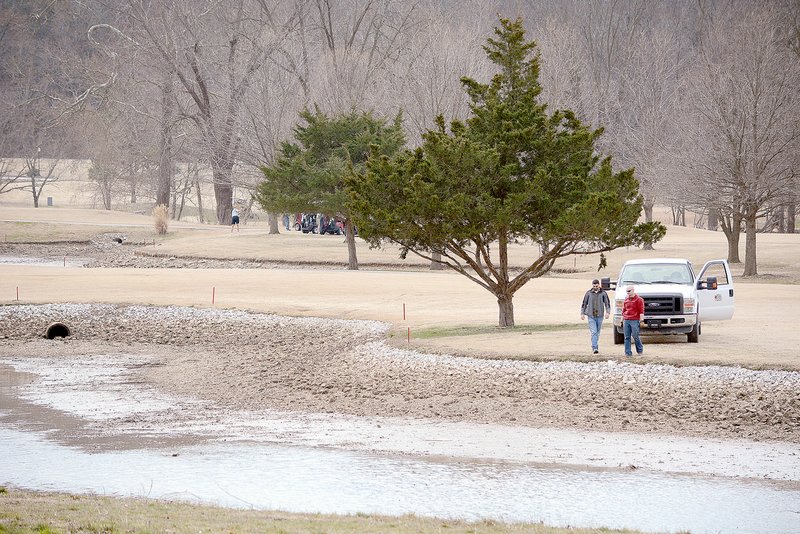Fish are stocked year in Bella Vista's man-made lakes. Many of those fish are purchased from nurseries in the area.
Next year, if fisheries biologist Rick Echols' plan is successful, fish purchases may not be as necessary.
Not only does the Property Owners Association manage seven lakes around the community, they also own several golf course ponds around the village. When Echols started as the POA's fisheries biologist, he brought experience in aquaculture. When he saw the golf course ponds, he spotted an opportunity.
Two ponds on the Berksdale Golf Course, visible from U.S. Highway 71, were drained last week to prepare them to be fish nurseries, Echols said. The ponds are only three to three-and-a-half feet deep, which is perfect for aquaculture, Echols said.
As the water was lowered, the fish in the ponds were removed. Echols said he found a variety of fish. There were a couple of small-mouth bass and a couple of large-mouth bass, some bluegill and some common carp. Echols can't be sure where the fish came from. Some may have been in Sugar Creek when it flooded, then were stranded in the pond when the flood receded. But others were probably put there by fishermen, he said. Anglers like to move fish around, he explained.
Grass carp which were put in to control vegetation in the ponds were moved to another pond. The other fish, maybe a couple of hundred, he speculated, were moved to a POA lake.
The ponds have to dry for about three weeks. Drying the bottom of the pond will kill some insects that could prey on the tiny fish. After the ponds are thoroughly dried, he'll pump them full with water from Little Sugar Creek.
Echols would like to buy walleye to grow in the ponds, but he doesn't have money in his budget to purchase them. He's hoping the state will have extra to donate to his new program. The tiny walleye would spend about two months in the pond, where they are somewhat protected. Then Echols would move them, probably to Lake Avalon. For those two months in the ponds, the fish would be eating plankton, but if he kept them longer, they would need other, smaller fish to feed on.
Lake Avalon, he explained, has a heated fishing dock and walleye will continue to bite all winter, so some Bella Vista residents who miss ice fishing up north will enjoy fishing all winter.
None of the Bella Vista's lakes have walleye now, but some lakes have been stocked with a hybrid, saugeye. The advantage of walleye is that they can reproduce if they survive to be adults in Avalon. Another advantage is that a mature walleye can eat a bass, and Bella Vista actually has too many bass.
He has a back up plan if he can't get the walleye. He can round up his own brood stock of black crappie and let them reproduce in the nursery pond. Then he could distribute the fish in all the lakes.
There are risks involved with nursery ponds, Echols said. Wildlife, including herons, will eat their share of baby fish, he said. They should be safe from raccoon because of the size of the pond, but an otter could do some serious damage.
There's always the risk of flooding, he said, but even if a flood covered the area, some fish would remain deep in the ponds, avoiding the current.
He's even thought about stray anglers who stop on the highway to fish in the ponds. They won't be able to catch the tiny fish, and if they do catch the brood stock that's just as well, Echols said. The parents will eat some of their young, so if they are removed more young will survive.
"It's an experiment. There's no sure thing here," Echols said, but if it works it will be a cost savings for the POA and a benefit to all people who enjoy fishing Bella Vista's lakes. So far, he said, the golfers don't seem to mind the new use for the ponds, although the fisheries staff has been fielding questions.
General News on 02/24/2016
